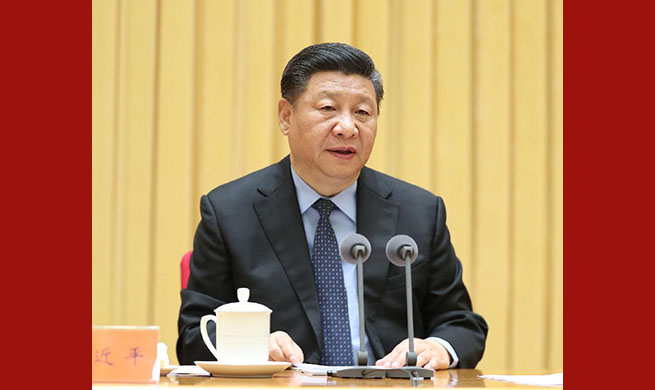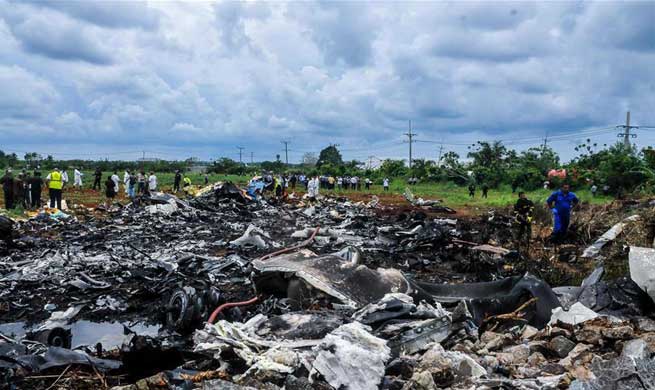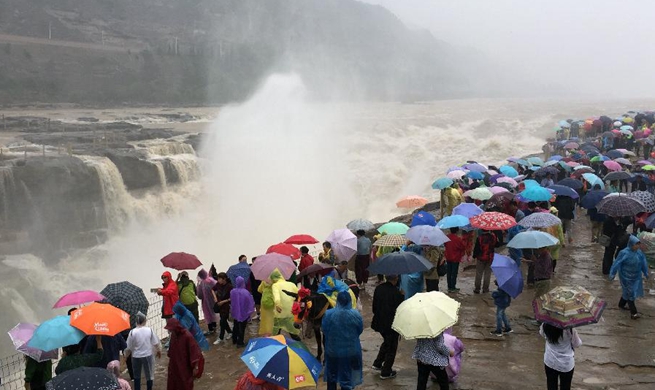KUNMING, May 19 (Xinhua) -- Xiao Zinan's family of five and their pigs crowded into a small log cabin in the mountains for about 30 years.
Xiao, 33, is in charge of public security in Jinman Village in Nujiang Lisu Autonomous Prefecture in southwest China's Yunnan Province. It is named after Nujiang, China's "Angry River," which runs from north to south throughout the prefecture.
"On rainy days, it always poured outside and drizzled inside," Xiao said.
Bordering Myanmar, Jinman is a poverty-stricken village among 3,000-meter peaks. Up to 90 percent of its farmland lays on the mountains at a slope of more than 25 degrees. The vast majority of the 1,400 villagers earn less than 2,800 yuan (440 U.S. dollars) per year.
To maximize land-use on mountains, all residents build their wooden houses in two layers, with the lower level for livestock such as pigs, cattle and chickens, and the higher for people.
"I was desperately in need of a change that could make my family live more comfortably," Xiao said. "But my ambition dwarfs a monthly salary of no more than 2,000 yuan and a whole family to support."
Twenty-four out of the 29 villages in Nujiang are in abject poverty where more than 38 percent of its 540,000 population are below the poverty line, ten-times higher than the national level.
Nujiang is home to more than 40 peaks higher than 4,000 meters and most residents are ethnic minorities, with the Lisu group accounting for more than a half.
"Most ethnic groups in the remote mountainous areas took part in the slash-and-burn cultivation before 1949 and transformed directly into a contemporary society after the founding of the People's Republic of China," said Na Yunde, secretary of the Prefecture Party Committee.
"Due to inconvenient transportation and complex geographical conditions, these groups have long been disconnected to the outside world. Even now, more than 40 percent of residents cannot speak Mandarin and not a single express way runs in the prefecture," he added.
Under China's poverty relief campaign to lift all rural people out of poverty by 2020, Nujiang has been relocating those in poverty-hit communities to developed areas since 2016, constructing houses and offering tailored social services to ensure smooth relocation.
"To lift the region out of poverty, relocation is one of the key drives," Na said.
Kai Nanzi, deputy director of Jinman village committee, said the relocation work was all based on the consensus of the villagers and the reclaimed farmland remained in the hands of residents themselves.
"For those unwilling to go, we will help them reconstruct or consolidate their old log houses," Kai said.
"Young people are excited to move out to embrace the modern world, but for the elderly who has been living in the mountains for most of their lives, they still need time to fit into the fast developing society," Kai said.
By the end of 2017, a total of 983 residents from 257 households in Jinman had signed relocation contracts to move to three newly-built communities, and 232 households, including Xiao Zinan, had already moved in.
With a deposit of only 2,000 yuan, Xiao's brand new river-view house of more than 95 square meters has three bedrooms and is fully furnished. He and other residents drew lots to choose their new homes.
"My wife found a job in the nearby hospital. She works half a month earning about 1,500 yuan. We also sell the vegetables we grow to a nearby market," he said.
"Life is getting better," Xiao added. "Most importantly, my children can enjoy better education in the town instead of in the mountains."
So far, Yunnan has invested more than 60 billion yuan on alleviating poverty through relocation and plans to relocate a total of 650,000 impoverished people including 100,000 in Nujiang by the end of 2020 to help lift them out of poverty.
Xiao is preparing a potato cooperative and has changed his old house in the mountains to produce potato chips, which is expected to benefit about 50 households.
"Potato is a common crop in our village and a cooperative of its kind could provide more job opportunities in the mountains," he said.
"If it were not for the relocation, poverty would remain in my village like it did for generations," Xiao said. "But now, at least my children could have a chance to make a difference."

















